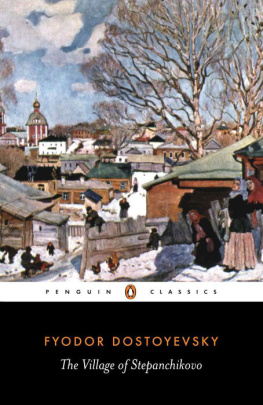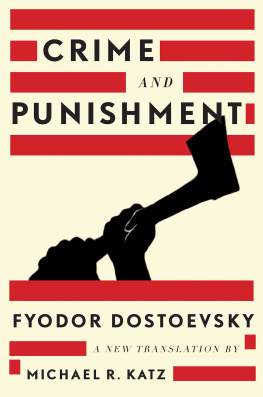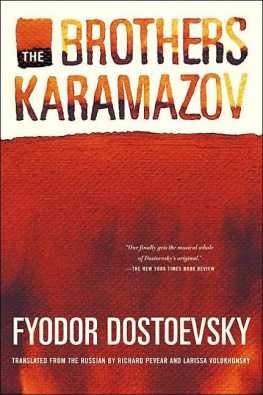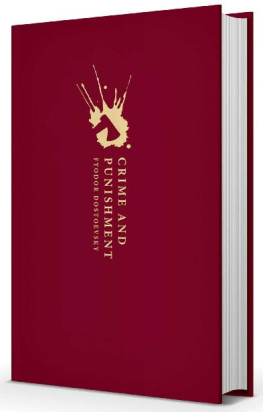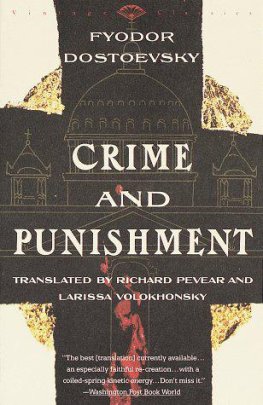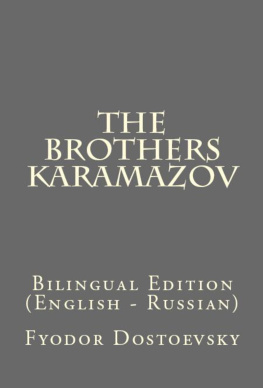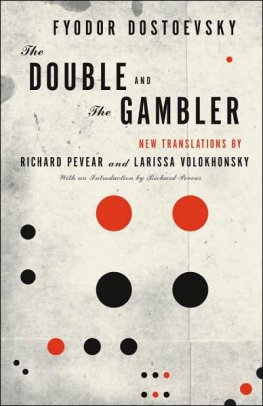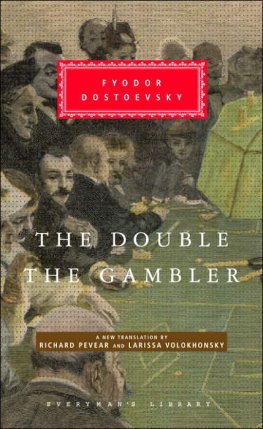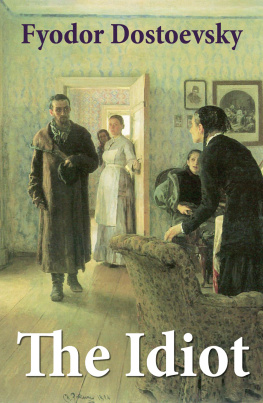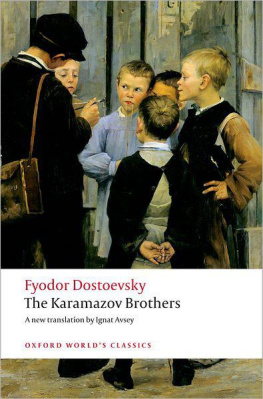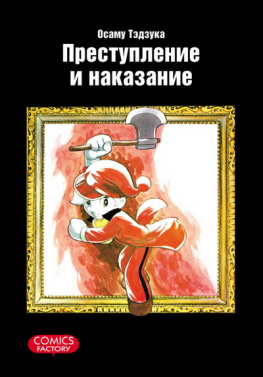Fyodor Dostoevsky - The Village of Stepanchikovo and Its Inhabitants
Here you can read online Fyodor Dostoevsky - The Village of Stepanchikovo and Its Inhabitants full text of the book (entire story) in english for free. Download pdf and epub, get meaning, cover and reviews about this ebook. year: 1995, publisher: Penguin, genre: Art. Description of the work, (preface) as well as reviews are available. Best literature library LitArk.com created for fans of good reading and offers a wide selection of genres:
Romance novel
Science fiction
Adventure
Detective
Science
History
Home and family
Prose
Art
Politics
Computer
Non-fiction
Religion
Business
Children
Humor
Choose a favorite category and find really read worthwhile books. Enjoy immersion in the world of imagination, feel the emotions of the characters or learn something new for yourself, make an fascinating discovery.
- Book:The Village of Stepanchikovo and Its Inhabitants
- Author:
- Publisher:Penguin
- Genre:
- Year:1995
- Rating:3 / 5
- Favourites:Add to favourites
- Your mark:
- 60
- 1
- 2
- 3
- 4
- 5
The Village of Stepanchikovo and Its Inhabitants: summary, description and annotation
We offer to read an annotation, description, summary or preface (depends on what the author of the book "The Village of Stepanchikovo and Its Inhabitants" wrote himself). If you haven't found the necessary information about the book — write in the comments, we will try to find it.
Fyodor Dostoevsky: author's other books
Who wrote The Village of Stepanchikovo and Its Inhabitants? Find out the surname, the name of the author of the book and a list of all author's works by series.
The Village of Stepanchikovo and Its Inhabitants — read online for free the complete book (whole text) full work
Below is the text of the book, divided by pages. System saving the place of the last page read, allows you to conveniently read the book "The Village of Stepanchikovo and Its Inhabitants" online for free, without having to search again every time where you left off. Put a bookmark, and you can go to the page where you finished reading at any time.
Font size:
Interval:
Bookmark:

THE VILLAGE OF STEPANCHIKOVO
AND ITS INHABITANTS
F YODOR M IKHAILOVICH D OSTOYEVSKY was born in Moscow in 1821, the second of a physicians seven children. When he left his private boarding school in Moscow he studied from 1838 to 1843 at the Military Engineering College in St Petersburg, graduating with officers rank. His first story to be published, Poor Folk (1846), was a great success. In 1849 he was arrested and sentenced to death for participating in the Petrashevsky circle; he was reprieved at the last moment but sentenced to penal servitude, and until 1854 he lived in a convict prison at Omsk, Siberia. In the decade following his return from exile he wrote The Village of Stepanchikovo (1859) and The House of the Dead (1860). Whereas the latter draws heavily on his experiences in prison, the former inhabits a completely different world, shot through with comedy and satire. In 1861 he began the review Vremya (Time) with his brother; in 1862 and 1863 he went abroad, where he strengthened his anti-European outlook, met Mile Suslova, who was the model for many of his heroines, and gave way to his passion for gambling. In the following years he fell deeply in debt, but in 1867 he married Anna Grigoryevna Snitkina (his second wife), who helped to rescue him from his financial morass. They lived abroad for four years, then in 1873 he was invited to edit Grazhdanin (The Citizen), to which he contributed his Diary of a Writer. From 1876 the latter was issued separately and had a large circulation. In 1880 he delivered his famous address at the unveiling of Pushkins memorial in Moscow; he died six months later in 1881. Most of his important works were written after 1864: Notes from Underground (1864), Crime and Punishment (18656), The Gambler (1866), The Idiot (1869), The Devils (1871) and The Karamazov Brothers (1880).
I GNAT A VSEY was born in Ludza (Lucin), Latvia. He came to England in 1951, and was planning to enter upon a career in engineering, but subsequently changed to the humanities. He is currently a lecturer in Russian language and literature at the University of Westminster, London. His other major published translation is Dostoyevskys The Karamazov Brothers and he is currently working on the first translation into English of Dmitry Merezhkovskys historical drama Paul I.
After his retirement from military service, my uncle, Colonel Yegor Ilyich Rostanev, moved to his inherited estate of Stepanchikovo and settled down there so readily that one would have supposed he had been born and bred on the estate and never left it. Some natures are completely satisfied with everything and are readily adaptive to all circumstances; such a nature was the retired Colonels. It would be difficult to imagine a man more benign and compliant. If one had asked him for a ride on his back for a distance of say two versts, the Colonel would probably not have refused. His generosity was such that on occasion he would have been ready to part with everything on the spot, down to his last shirt, and hand it to any needy person he chanced to meet. He was very powerfully built: tall and well-proportioned, with a fresh complexion, ivory-white teeth, a full, reddish-brown moustache, and a rich sonorous voice which rang pleasantly when he laughed. His manner of speaking was hurried and uneven. At the time of his retirement, he was around forty; from about the age of sixteen he had spent all his life in the hussars. He had married very young and loved his wife dearly. When she died, he was left with a host of tender and grateful memories. Finally, after inheriting Stepanchikovo, which increased his estate to six hundred serfs, he decided to forsake military life and settle in the country with his children eight-year-old Ilyusha (whose birth had cost his mother her life) and his elder daughter Sashenka, a girl of about fifteen who had been attending boarding-school in Moscow since her mothers death. But soon my uncles house was to become a veritable Noahs Ark, and this is how it came about.
At the same time as he inherited his estate and retired from the army, his mother, the wife of General Krakhotkin, lost her husband. This had been her second marriage, contracted sixteen years earlier, when my uncle was only a second lieutenant and was himself thinking of taking a wife. For a long time his mother had refused to countenance such a union she wept bitter tears, reproached him with selfishness, ingratitude, and disrespect; tried to prove that his estate two hundred and fifty serfs in all was barely sufficient to support his family as it was (that is, her own self with her establishment of hangers-on, pug and spitz dogs, Chinese cats, and so on); and then suddenly, quite unexpectedly, in the midst of all her reproaches, accusations and tantrums, even before her son, and notwithstanding her forty-two years, entered into matrimony herself. But even now she was able to find a pretext for directing further reproaches at my poor uncle, maintaining that the only reason she had taken a husband was to provide herself with a refuge in her old age a refuge which her disrespectful, egotistical son had denied her by taking the outrageous step of setting up his own home.
It has always been a mystery to me why such an apparently level-headed person as the late General Krakhotkin should have chosen to marry a forty-two-year-old widow. It must be assumed that he suspected she had money. Some were of the opinion that he simply needed a nurse, as even at that time he probably foresaw the succession of maladies which were to plague him in old age. It is certain, however, that the old General had no respect for his wife during the entire period of their married life, and mocked her mercilessly at every available opportunity. He was a strange person. Semi-educated but by no means a fool, he hated all and sundry, submitted to no authority, took perverse pleasure in ridicule and mockery, and in old age, from ill-health that resulted from a none too regular or virtuous way of life, grew short-tempered, irritable and stonyhearted. His service career had been successful until, in consequence of some unpleasant incident, he had been obliged to resign his commission in undignified haste, narrowly escaping court martial and having to forego his pension. He became embittered. Almost completely without means, this owner of a hundred-odd impoverished serfs turned his back on the world, and for the rest of his life, twelve years or so, never bothered to inquire how or by whom he was being maintained; at the same time he insisted on enjoying all of lifes comforts, refused to limit his expenses, and kept a carriage. Before long he lost the use of his legs and spent the remaining ten years of his life in a wheelchair, attended by two seven-feet-tall manservants upon whom he heaped every kind of abuse. Carriage, servants and wheelchairs were provided and maintained by the disrespectful son, who supplied his mother with cash borrowed on security several times over, denying himself necessities, incurred debts which he had practically no hope of settling from his meagre income, and who for all that remained in her eyes an ungrateful and hard-bitten egotist of a son. My uncles character, however, was such that finally he too began to believe in his own egotism, and, in self-punishment and an attempt to prove he was otherwise, sent his mother more and more money.
The Generals wife worshipped her husband. But her greatest pleasure was derived from the fact that he was a general, and that she could therefore rejoice in the title of Generals Lady. She had her own suite of rooms in the house where, during the whole period of her husbands semi-existence, she flourished in the company of numerous hangers-on, gossips and lap-dogs. In the little provincial town she was a person to be reckoned with. Invitations to weddings and christenings, kopeck-stake card games and universal adulation more than compensated for her domestic frustrations. Gossips called on her regularly with their latest reports; everywhere she went she was accorded a place of honour; in short, she exploited to the full all the privileges that her husbands title afforded. The General did not interfere in any of this, but he taunted her mercilessly in public. He would ask out loud, for instance, Whyever did I marry that sanctimonious old hag? and no one dared to argue with him. One after another all his acquaintances turned their backs on him a treatment ill-suited to his desperate dependence on society, for he loved to talk and argue, he simply loved to have a listener permanently seated before him. As a freethinker and old-style atheist, he had a need to discourse from time to time on lofty matters.
Next pageFont size:
Interval:
Bookmark:
Similar books «The Village of Stepanchikovo and Its Inhabitants»
Look at similar books to The Village of Stepanchikovo and Its Inhabitants. We have selected literature similar in name and meaning in the hope of providing readers with more options to find new, interesting, not yet read works.
Discussion, reviews of the book The Village of Stepanchikovo and Its Inhabitants and just readers' own opinions. Leave your comments, write what you think about the work, its meaning or the main characters. Specify what exactly you liked and what you didn't like, and why you think so.

